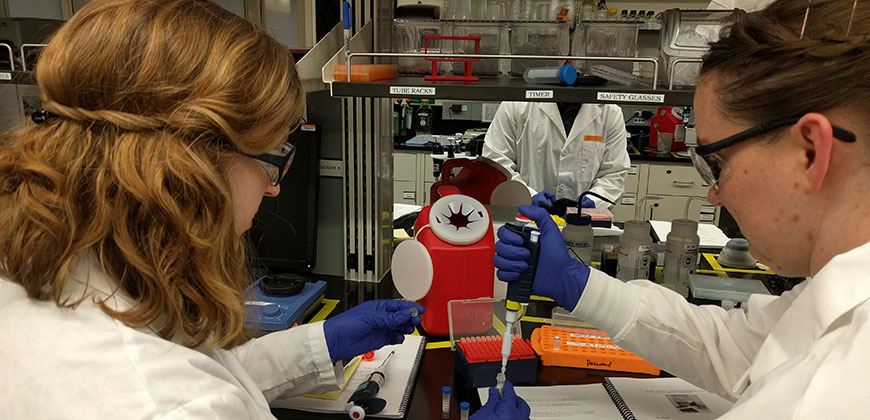FBI gets synthetic biology crash course at CSU
by Anne Manning | June 7, 2017 10:00 PM

FBI personnel work on a Gibson Assembly project in Professor Jean Peccoud’s lab, during a weeklong on-campus training in synthetic biology.
For one week in May, 11 agents and analysts from the U.S. Federal Bureau of Investigation were on campus for an intensive training program spearheaded by one of the university’s preeminent biotechnologists. The goal: giving the law enforcement personnel foundational knowledge and insight into the rapidly evolving field of synthetic biology.
Jean Peccoud[1], the Abell Endowed Chair in Synthetic Biology in the Department of Chemical and Biological Engineering, organized the session with the FBI. Peccoud is a computational and cell biologist whose research is in the development of novel DNA molecules, and improving the manufacture of bio-based drugs and vaccines.
At first glance, a relationship between synthetic biology researchers and the nation’s top law enforcement agency might seem incongruous. Consider, though, the rapid development of genetic engineering techniques over the last several years. The agents who visited campus were part of the FBI’s Weapons of Mass Destruction Directorate, whose purview includes preventing and responding to chemical, biological, radiological and nuclear incidents.
The WMD Directorate is working to build relationships with universities and industry partners to become educated on trends in biological research – from the manufacture of living organism-based vaccines, to the synthesis of new genes in the lab, said William So, Policy and Program Specialist with the FBI’s Weapons of Mass Destruction Directorate’s Biological Countermeasures Unit.
The emergence of big data within the life sciences, and the digitized stores of data that could be vulnerable to cyberattacks, has also pushed the agency to become better versed in these areas. Ultimately, the agency is charged with protecting such systems against terrorism, espionage, or the leaking of proprietary information.
“The amount of research and information in the biotechnology fields is increasing exponentially,” So said. “It’s important for us to have hands-on experience to better understand how biological experimentation occurs.”
Lab work
The workshop was the first of its kind at CSU; Peccoud previously led a scaled-down pilot workshop at his former university, Virginia Tech. The CSU workshop consisted of lectures on research trends by Peccoud and other CSU experts. It also included blocks of lab time for training participants to perform typical synthetic biology techniques, such as assembling DNA molecules.
For example, the trainees used Gibson Assembly to make DNA and transfer it to E. coli cells for manufacturing insulin. This lab work was led by Neil Adames, a research scientist in Peccoud’s lab.
This experiment gave the participants insight into a foundational method of producing biologic drugs within the pharmaceutical industry. It illustrated the aspirations of both scientists and “DIYBio” communities to engineer genes with powerful new properties.
“Our motivation here is to help people working in the field to critically analyze information they are getting about breakthroughs and trends in biological engineering and research,” Peccoud said. “It is one thing to talk to scientists at conferences or read papers, but it is another to get hands-on training and to have an understanding of what certain concepts mean in practice.”
Other activities included a talk about CRISPR and genome editing by University Distinguished Professor Jan Leach; a visit to the biochemistry protein purification facility; a tour of BioMARC, the university’s biologics manufacturing research facility; and an overview of CSU’s biosafety policies led by Bob Ellis of the Office of the Vice President for Research.
Peccoud envisions the weeklong training to be offered regularly, and possibly to become available to other federal agencies and corporate partners
- Jean Peccoud: http://source.colostate.edu/dna-language-lets-write-well-says-jean-peccoud/
Source URL: https://source.colostate.edu/fbi-gets-synthetic-biology-crash-course-csu/
Copyright ©2024 SOURCE unless otherwise noted.